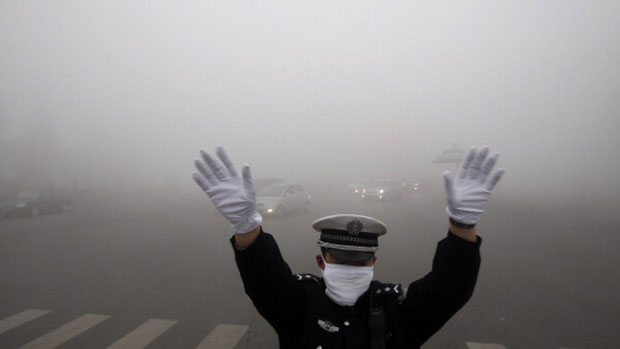China's war on pollution: how can they clear the smog?
Chinese government declares a 'war on pollution', in a bid to fuel a 'great rejuvenation' for the country

A free daily email with the biggest news stories of the day – and the best features from TheWeek.com
You are now subscribed
Your newsletter sign-up was successful
CHINESE president Li Keqiang said smog in China was now a major problem and announced that the government would "declare war" on pollution.
At the opening of the annual meeting of parliament, Li announced new plans to reduce toxic gasses by banning high-emission cars and closing coal-powered furnaces.
"We will resolutely declare war against pollution as we declared war against poverty," Li told the 3,000 delegates in Beijing's Great Hall who have gathered for the annual session of the National People's Congress.
The Week
Escape your echo chamber. Get the facts behind the news, plus analysis from multiple perspectives.

Sign up for The Week's Free Newsletters
From our morning news briefing to a weekly Good News Newsletter, get the best of The Week delivered directly to your inbox.
From our morning news briefing to a weekly Good News Newsletter, get the best of The Week delivered directly to your inbox.
Pollution, Li said, is "nature's red-light warning against inefficient and blind development".
His comments are seen as significant. "This is an acknowledgement at the highest level that there is a crisis," Craig Hart, an expert on Chinese environmental policy and associate professor at China's Renmin University told Reuters.
Air pollution regularly reaches hazardous levels in China. Last week, Chinese scientists said that toxic air pollution in Beijing is now so bad it resembles nuclear winter. Smog is now impeding photosynthesis in plants, something that could end up "wreaking havoc" on the country's food supply, the scientists warned.
In Beijing, concentration of PM2.5 particles – the tiny atoms that cause the air to appear hazy and produce adverse health effects when inhaled – rose to 505 micrograms per cubic metre last week. The World Health Organisation (WHO) recommends a safe level of 25.
A free daily email with the biggest news stories of the day – and the best features from TheWeek.com
So aside from the measures proposed yesterday, what should China do to try to clear the smog?
The new plans to target car emissions and reduce the country's reliance on coal meet two of environmental activism group Greenpeace's central recommendations for reducing pollution.
Greenpeace also recommends that China:
- Makes air quality information more easily available to the public.
- Establish legally binding plans to reach national air quality standards with clear timelines.
- Cap regional coal consumption.
- Hike up pollution discharging charges and strengthen supervision efforts
China doesn't just suffer from smog, however. Li's proposals also aim to tackle serious water and soil pollution in the country.
Parliament pledged to take on agricultural pollution and try to reduce heavy metal contamination in farmland. More than three million hectares of land around the country (eight million acres) is believed to be too polluted to grow crops.
Last month the Chinese Ministry of Water Resources announced new measures to improve the country's management of its water supplies, China Daily reports. The ministry plans to spend two trillion yuan, or $330bn, to tackle the problem of water pollution, Reuters reports.
China already suffers from water shortages, and the country's dependence on coal-fired industry – which uses a massive amount of water to suppress dust and clean the fossil fuel before it is burnt – exacerbates the problem.
Li concluded his congress speech with a rousing call to arms. "With all these efforts, we can surely realise the Chinese dream of the great rejuvenation of the Chinese nation."
-
 How the FCC’s ‘equal time’ rule works
How the FCC’s ‘equal time’ rule worksIn the Spotlight The law is at the heart of the Colbert-CBS conflict
-
 What is the endgame in the DHS shutdown?
What is the endgame in the DHS shutdown?Today’s Big Question Democrats want to rein in ICE’s immigration crackdown
-
 ‘Poor time management isn’t just an inconvenience’
‘Poor time management isn’t just an inconvenience’Instant Opinion Opinion, comment and editorials of the day
-
 Epstein files topple law CEO, roil UK government
Epstein files topple law CEO, roil UK governmentSpeed Read Peter Mandelson, Britain’s former ambassador to the US, is caught up in the scandal
-
 Iran and US prepare to meet after skirmishes
Iran and US prepare to meet after skirmishesSpeed Read The incident comes amid heightened tensions in the Middle East
-
 Israel retrieves final hostage’s body from Gaza
Israel retrieves final hostage’s body from GazaSpeed Read The 24-year-old police officer was killed during the initial Hamas attack
-
 China’s Xi targets top general in growing purge
China’s Xi targets top general in growing purgeSpeed Read Zhang Youxia is being investigated over ‘grave violations’ of the law
-
 Panama and Canada are negotiating over a crucial copper mine
Panama and Canada are negotiating over a crucial copper mineIn the Spotlight Panama is set to make a final decision on the mine this summer
-
 Why Greenland’s natural resources are nearly impossible to mine
Why Greenland’s natural resources are nearly impossible to mineThe Explainer The country’s natural landscape makes the task extremely difficult
-
 Iran cuts internet as protests escalate
Iran cuts internet as protests escalateSpeed Reada Government buildings across the country have been set on fire
-
 US nabs ‘shadow’ tanker claimed by Russia
US nabs ‘shadow’ tanker claimed by RussiaSpeed Read The ship was one of two vessels seized by the US military